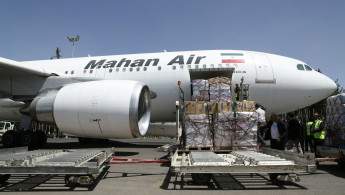US pressures EU to ban Iran's 'Revolutionary Guards airline'
An Iranian airline affiliated with the country’s controversial Revolutionary Guard that has allegedly been used to transfer weapons and fighters to Syria to support Bashar al-Assad, has gained the rights to operate commercial flights in more than twelve European and Asian countries despite featuring on a US terror-related sanctions list.
Mahan Air, Iran’s second largest carrier, has been accused by the US of facilitating the “transportation, funds transfers and personnel travel services" to the Qods Force, transporting the elite unit of the Revolutionary Guard corps and armaments to Syria in order to provide training to members of both the Syrian army, the Lebanese Shia paramilitary group Hizballah, and other combatant forces fighting in support of Syrian President Bashar al-Assad.
Post-nuclear sanctions
While the agreement Iran signed with the US and four other world powers late last year ended sanctions imposed on Tehran for its nuclear programme, sanctions related to ballistic missile research, terrorism, human rights abuses, and money laundering remain in place.
Many countries continue to sanction Mahan Air in accordance with US terror sanctions.
A matter of weeks before the landmark nuclear deal was signed in July 2015, the Iranian airline announced that it was opening up a new route to Munich, its second German destination.
"By letting Mahan in, the Europeans are forgoing a critical pressure tool they have in their arsenal of nonmilitary coercive measures to pressure Iran and (Syrian President Bashar) Assad," said Emanuele Ottolenghi, an Iran expert at the Center on Sanctions and Illicit Finance at the Foundation for Defense of Democracies, speaking to The Associated Press.
The US lacks any legal leverage to change EU laws related to Mahan Air and attempts to persuade European states to follow Washington’s example has been met with considerable resistance. Instead, the US is currently limited to pursuing companies that work with the Iranian airline such as banks, baggage handling companies, and cargo and freight companies.
Supporting Iran's military agenda
Speaking to AP, a spokesperson for the European Union said that Mahan Air was currently under no EU sanctions, and had not been since 2014. In recent weeks the EU has also drawn Washington’s ire for lifting a ban on the Iranian Bank Saderat, which the US says is used as a vessel to transport money to groups such as Hamas and Hizballah deemed terror organizations according to US law.
Mahan Air denies that it belongs to “any government or military bodies or to any political party or individuals”.
However, the airline’s current chairman and chief executive, Hamid Arabnejad is closely affiliated with the Revolutionary Guard and in 2013 was sanctioned by Washington for having "been instrumental in facilitating the shipment of illicit cargo to Syria on Mahan Air aircraft."
While Washington has pressured EU states to impose sanctions on Mahan Air, Washington notably lifted sanctions against Iran’s largest carrier Iran Air.
"We're not saying Mahan Air assists the IRGC; we'd say Mahan Air is the IRGC — and we have to give notice to our friends in Europe," said Republican Senator Brad Sherman, an advocate of bans on Mahan Air, in comments published by AP. "This idea that we can allow Mahan Air to do whatever it wants just because there are temporary restrictions on the nuclear deal — that wasn't the deal."
Iran's Revolutionary Guard Corps, with which Mahan Air is linked, is a hugely influential military conglomerate, including naval, air, and ground components organised parallel to the Iranian military. Additionally, it packs considerable economic muscle and is possibly Iran’s biggest economic player, with interests and investments in almost all sectors including oil and gas, automobile production, telecommunications, construction, and farming.
Agencies contributed to this report.





 Follow the Middle East's top stories in English at The New Arab on Google News
Follow the Middle East's top stories in English at The New Arab on Google News


